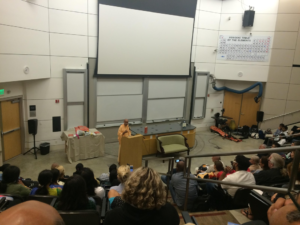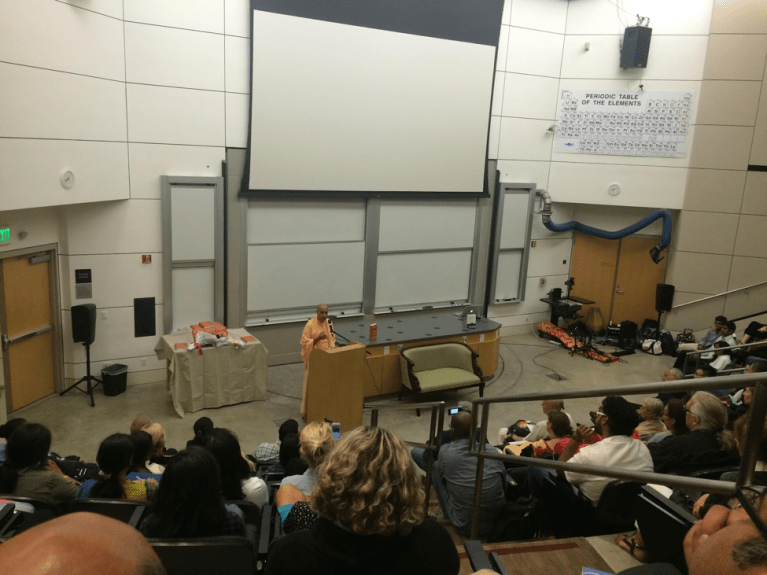On July 21, Stanford Bhakti Yoga Club and the Hindu Student Association of Stanford hosted spiritual leader Radhanath Swami for a talk called “Redefining Success.” During the 500-person event, Swami discussed compassion and balancing one’s inner and outer worlds.

Swami was born in Chicago in 1950, and growing up, he witnessed civil injustices and participated in civil rights movements. At the age of 19, in 1970, he hitchhiked from Europe to India in search of spiritual knowledge. Since then, Swami has become a renowned spiritual and humanitarian figure, leading projects that range from a meal program for impoverished children to a eye camp where patients can get cataracts removed for free. A New York Times-bestselling author, he has also written two books: “The Journey Home: Autobiography of an American Swami” and “The Journey Within.”
Bhakti Yoga Financial Officer and Ph.D. student Khonika Gope says that event planners asked Swami to speak at Stanford after learning that he would be giving talks at local corporations such as Apple and Google. The Stanford Bhakti Yoga Club, which seeks to empower its members through meditation, yoga and cooking, invited Swami to spread his message about yoga’s connection to the world.
“If you look at ancient India, people used to do yoga to connect to their inner self, to connect to others [and] to connect to other creatures,” Gope said. “Even the word yoga means connection. We should pause and think about who we are, what is our mission, how we can contribute to the rest of the world, how we can find peace within ourselves and how we can establish peace in the world.”
Bhakti Yoga faculty advisor Himanshu Asnani M.S. ’11 Ph.D. ’14, a lecturer in the electrical engineering department, believes increasing innovation in the Stanford area makes Swami’s talk especially pertinent to the University and surrounding community.
“Stanford is an epicenter for many technological advances — many scientific developments,” Asnani said before Swami’s talk. “We realize that it can often lead to excluding ourselves from the world around us, so he’s going to be talking about how to balance our lives.”
The event began with music mantra meditation, an interactive call-and-response meditation technique that lasted for 20 minutes. Clinical Professor of Neurosurgery James Doty, founder of Stanford’s Center for Compassion and Altruism Research and Education, spoke briefly about compassion and care, sharing a personal story about finding spirituality after a bankruptcy.
After Swami’s discussion of success, fulfillment, connection and spirituality, the event ended with a book signing and a vegetarian dinner.
Throughout his talk, Swami shared personal anecdotes about experiences that helped shape him as a teacher and person. Attendee Vivek Kaul especially enjoyed a story about Swami’s passage on a British Airways flight that had an emergency landing and nearly crashed – leaving passengers in panic and fear.
“Different people felt the same in respect to whether they were in economy class or business class or first class,” Kaul said. “Whatever your background was, you were in the same situation at that point. It showed what you should value more during your life and how you should treat each other.”
Prasanna Sundararajan, who heard about the event at his temple, connected with Swami’s point about redirecting focus from materialistic values to one’s inner self — a message that Swami said he particularly hoped his audience would take away.
“Spirituality is about finding the deepest meaning, fulfillment and love within ourselves and utilizing whatever occupation or relationships to express that love … rather than constantly seeking more and more things to fill the emptiness within us,” Swami told The Daily. “We all actually are very rich and happy people within, but we’ve forgotten that because we’re looking everywhere else.”
Contact Janet Wang at janet.wang.2012 ‘at’ gmail.com.
